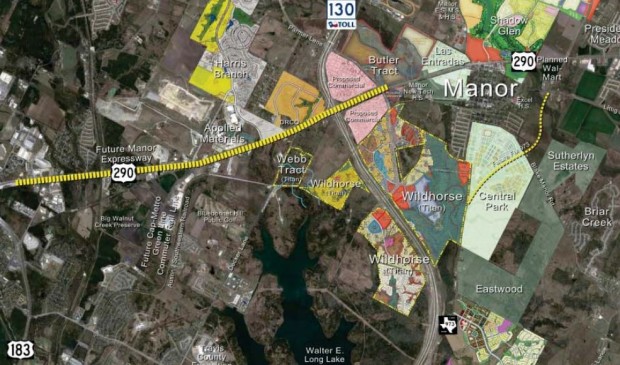PID problems aired at Commissioners Court
Wednesday, April 20, 2016 by
Caleb Pritchard Two Travis County commissioners are each keeping a wary eye on the slow creation of the county’s first-ever public improvement district, or PID.
Commissioners Brigid Shea and Gerald Daugherty took time during the Commissioners Court’s weekly voting session on Tuesday to air concerns about the specific PID before them, as well as PIDs in general.
The court approved in January a policy framework designed to guide the creation of the districts, which can issue bonds used to pay for public improvements such as roads, parks and community buildings.
Developers who petition for the creation of a PID can save money on infrastructure because the bond debt is repaid through assessments on individual property owners in the district. The county, meanwhile, can use the promise of those savings to extract concessions from the developer, including the promise of new affordable housing units.
However, the court left out any specific affordability requirements when it approved the PID policy, an omission that could leave Northeast Austin’s WildHorse Ranch, the county’s first potential PID, out of reach for lower-income families.
In January, the project’s developer, Pete Dwyer, told the Austin Monitor that hundreds of homes could sell for $180,000 each. However, until a formal agreement is in place, that number could shift downward. Also, on Tuesday, Shea said that the individual assessments from the PID’s bond debt could amount to $1,000 per year per homeowner.
“So I want to understand how that affects both the price of the home and the ability of the people living in that PID to pay it,” Shea said.
According to the original petition, the WildHorse Ranch PID would issue $65 million in bonds to fund roads, drainage projects and swimming pools, among other improvements. However, that list of projects could expand, driving the value of the projects and thus the bond issue up to $95 million, should the county give its consent.
Declaring that his concerns with PIDs are “much different” from Shea’s, Daugherty took an implied shot at the labor requirements cooked into the PID policy. The court in January mandated that developers wishing to benefit from PID money must abide by the Workers Defense Project’s Better Builder standards.
“I don’t think that we can continue to talk about affordability and not look at every aspect of everything that we are imposing on development,” Daugherty said. “We are pushed and pulled from a lot of different directions from organizations that want things imposed on development.”
Daugherty also noted that staff had previously reassured the court that the county would face little liability should any aspect of a PID project turn sour. However, more recently, he said, “I’ve got people coming to my office trying to convince me otherwise.”
After Planning and Budget Office County Executive Jessica Rio offered to share with Daugherty the findings, when complete, of an upcoming study on that very question, Commissioner Margaret Gómez advised her colleague to have faith in county staff.
“We’re very careful in Travis County,” Gómez told him. “We don’t really knee-jerk on issues that affect our financial position. We keep getting our AAA rating because we’re fairly conservative with our financial policies.”
For his part, Commissioner Ron Davis argued that each PID under consideration will have its own unique challenges and that the policy should be kept flexible. He praised the tools as simply an alternative funding option for the county to consider in certain cases.
After each commissioner weighed in on PIDs, County Judge Sarah Eckhardt called the question on the specific item before the court. The vote to accept a $25,000 check from WildHorse Ranch’s developers, and for the money to be placed in escrow in order to fund a county-solicited real estate market analysis of the PID’s feasibility, was unanimous.
Map courtesy of the city of Austin
You're a community leader
And we’re honored you look to us for serious, in-depth news. You know a strong community needs local and dedicated watchdog reporting. We’re here for you and that won’t change. Now will you take the powerful next step and support our nonprofit news organization?








